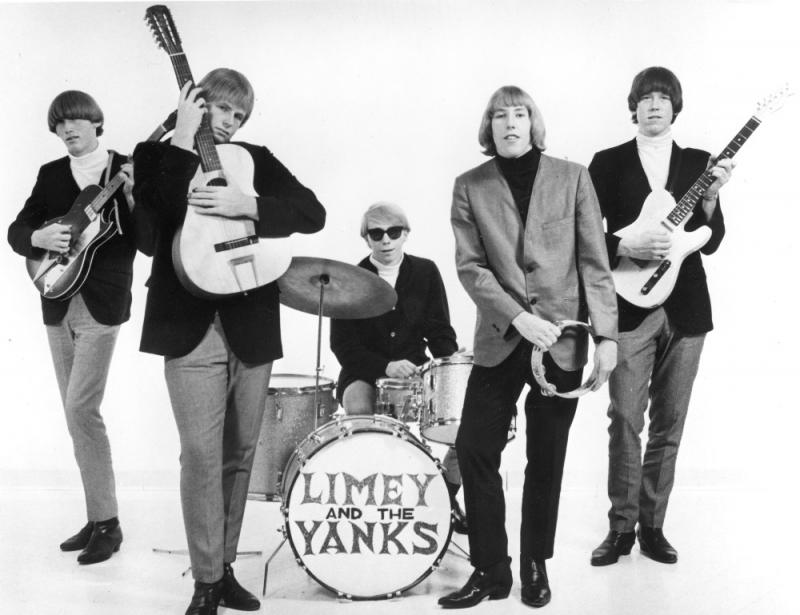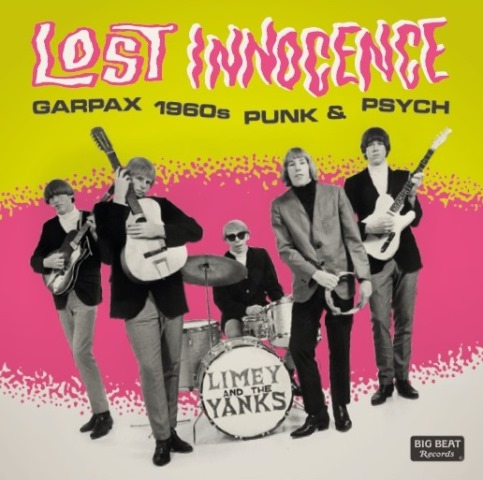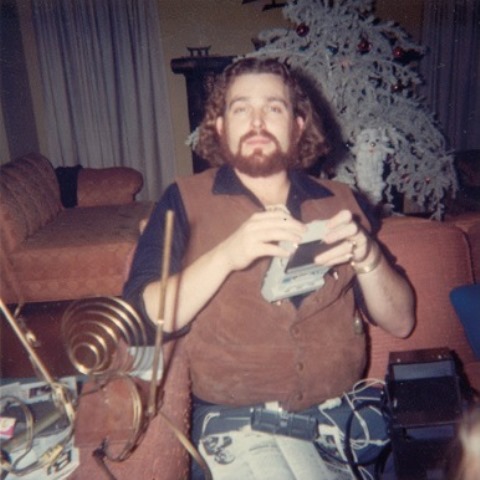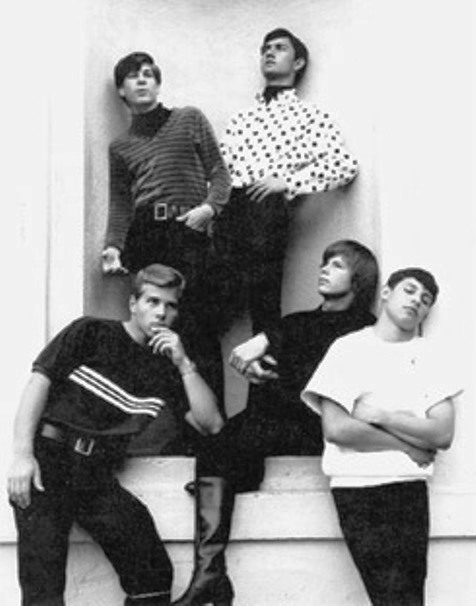Reissue CDs Weekly: Lost Innocence - Garpax 1960s Punk & Psych | reviews, news & interviews
Reissue CDs Weekly: Lost Innocence - Garpax 1960s Punk & Psych
Reissue CDs Weekly: Lost Innocence - Garpax 1960s Punk & Psych
High-octane collection of engineer-producer Gary Paxton’s excursions into garage rock

An old saw relating to The Doors says their ambition when they formed was to be as big as Los Angeles-based garage-psych sensations The Seeds. After listening to Lost Innocence – Garpax 1960s Punk & Psych, it’s hard not to wonder where the bands heard were aiming.
The Buddhas, Limey & The Yanks (whose frontman Steve Cook was English), the splendidly named Ken & The Forth Dimension (sic) and the others on Lost Innocence obviously aspired to success. Their association with Paxton may have helped them on the way. Did they want to occupy a slot similar to The Music Machine? Or maybe The Leaves? Perhaps The Spats? Possibly, and more realistically, The Brain Train? But the Lost Innocence bands sold barely any records. Labels like Pentacle, Shell-Dee and Star-Burst would not take anyone into the charts.
 None of this means anything on Lost Innocence isn’t stellar. Every cut is amazing. But the breaks did not come at the time. However, some tracks are familiar. In 1980, “Be a Cave Man” by The Avengers and “I Need Love” by The New Wing resurfaced alongside 16 other paint-peelers on the first Boulders album. Back then there was no information about these mysterious bands, just the aural (albeit badly replicated) evidence for their greatness. The Buddhas’s “Lost Innocence” received another shot a year earlier, when it was collected on the first volume of Pebbles. In time, Ken & The Forth Dimension were also rescued from pop-cultural oblivion. The thread between these bands was lacking though.
None of this means anything on Lost Innocence isn’t stellar. Every cut is amazing. But the breaks did not come at the time. However, some tracks are familiar. In 1980, “Be a Cave Man” by The Avengers and “I Need Love” by The New Wing resurfaced alongside 16 other paint-peelers on the first Boulders album. Back then there was no information about these mysterious bands, just the aural (albeit badly replicated) evidence for their greatness. The Buddhas’s “Lost Innocence” received another shot a year earlier, when it was collected on the first volume of Pebbles. In time, Ken & The Forth Dimension were also rescued from pop-cultural oblivion. The thread between these bands was lacking though.
Now, for the first time and from the master tapes, a coherent overview of these and more has arrived. This vital compilation is significant for what it does and the way it does it. Every band is discussed in the liner notes, every stone is turned over and context is given. The sound quality is superb.
 Paxton (pictured left, in 1966) is described as having “few peers in a business that, certainly during the golden era of the 1960s, thrived on innovation and inspiration. Paxton didn’t lead the way, but he didn’t follow either; his innovation was his inspiration, a feverish parade of crazy ideas that shouldn’t have worked but did, that marched to the beat of his own, rather unhinged, drum. Vintage garage rock is only one of the many tributaries of popular music that Gary Paxton recorded and produced, and compared to other genres, he was hardly prolific with it. But for a producer-engineer of his repute, it was inevitable that Paxton would cross paths with the sudden surge of rock groups that emerged in the wake of the British Invasion”.
Paxton (pictured left, in 1966) is described as having “few peers in a business that, certainly during the golden era of the 1960s, thrived on innovation and inspiration. Paxton didn’t lead the way, but he didn’t follow either; his innovation was his inspiration, a feverish parade of crazy ideas that shouldn’t have worked but did, that marched to the beat of his own, rather unhinged, drum. Vintage garage rock is only one of the many tributaries of popular music that Gary Paxton recorded and produced, and compared to other genres, he was hardly prolific with it. But for a producer-engineer of his repute, it was inevitable that Paxton would cross paths with the sudden surge of rock groups that emerged in the wake of the British Invasion”.
And therein lies a fascinating and fun aspect of this 24-track set. Everything is obviously American, recognisable as US garage-punk-psych. But some of what’s heard refracts or repurposes the British Invasion sounds which kick-started the boom dug into here. On “I’ll Never Let You Go” Carl Walden & The Humans are in thrall to Van Morrison and Them. So are The Avengers, with “Shipwrecked”. The Whatt Four’s “You’re Wishin’ I Was Someone Else” sounds a bit like Gene Clark’s “Elevator Operator” but is built around a riff analogous to that of “Ticket to Ride”. “Leather Coated Cottage” by Limey & The Yanks borrows a guitar figure from The Yardbirds’s “Happenings Ten Years Time Ago”. The Avengers’s peculiar “My True True Love” tries to sound like Herman’s Hermits and fails.
 Of course, there are American archetypes too. The Avengers’s (pictured right) “Be a Cave Man” points to the sound of The Monkees’s version of “(I'm Not Your) Steppin’ Stone” (recorded in 1966; “…Cave Man” is from 1965). Chiming folk rock is drawn from, and Don Hinson’s “The Peddlers of Hate” apes Barry McGuire’s protest pop. But it all exists in its own continuum – where a hell-for-leather spirit is what counted most. Gary Paxton was not about capturing precision.
Of course, there are American archetypes too. The Avengers’s (pictured right) “Be a Cave Man” points to the sound of The Monkees’s version of “(I'm Not Your) Steppin’ Stone” (recorded in 1966; “…Cave Man” is from 1965). Chiming folk rock is drawn from, and Don Hinson’s “The Peddlers of Hate” apes Barry McGuire’s protest pop. But it all exists in its own continuum – where a hell-for-leather spirit is what counted most. Gary Paxton was not about capturing precision.
The man behind these tracks was also, it is revealed, recording more than what was issued at the time. Eight tracks are previously unreleased masters, one of them by a band whose identity is unknown. Of these new-to-the-world cuts, The Fog’s “Grey Zone” is mind-bogglingly great. Heavy garage psych with a doomy atmosphere along the lines of Plague’s classic “The Face of Time”, it features rattling drums and an ominous descending melody. “A revolution is going on the grey zone” declare The Fog on this October 1968 recording. The band were from Bakersfield and otherwise dealt in country rock. The comp’s later tracks were taped at Paxton’s studio in Bakersfield, California’s country music hub.
It’s unlikely The Fog could have been as big as The Doors, The Music Machine or The Seeds. The stratum occupied by them and the other bands on Lost Innocence – Garpax 1960s Punk & Psych was never going to be exposed to the surface. No matter, as it’s unlikely that another equally high-quality compilation of this ilk will appear in 2021. The year has just begun, and a marker has already been set.
- Next week: Charles Mingus @ Bremen 1964 & 1975 – double CD of live workouts
- More reissue reviews on theartsdesk
- Kieron Tyler’s website
Share this article
The future of Arts Journalism
You can stop theartsdesk.com closing!
We urgently need financing to survive. Our fundraising drive has thus far raised £49,000 but we need to reach £100,000 or we will be forced to close. Please contribute here: https://gofund.me/c3f6033d
And if you can forward this information to anyone who might assist, we’d be grateful.

Subscribe to theartsdesk.com
Thank you for continuing to read our work on theartsdesk.com. For unlimited access to every article in its entirety, including our archive of more than 15,000 pieces, we're asking for £5 per month or £40 per year. We feel it's a very good deal, and hope you do too.
To take a subscription now simply click here.
And if you're looking for that extra gift for a friend or family member, why not treat them to a theartsdesk.com gift subscription?
more New music
 Album: The Black Keys - No Rain, No Flowers
Ohio rockers' 13th album improves on recent material, but still below mainstream peak
Album: The Black Keys - No Rain, No Flowers
Ohio rockers' 13th album improves on recent material, but still below mainstream peak
 Wilderness Festival 2025 review - seriously delirious escapism
A curated collision of highbrow hedonism, surreal silliness and soulful connection
Wilderness Festival 2025 review - seriously delirious escapism
A curated collision of highbrow hedonism, surreal silliness and soulful connection
 Album: Ethel Cain - Willoughby Tucker, I'll Always Love You
Relatively straightforward songs from the Southern Gothic star - with the emphasis on 'relatively'
Album: Ethel Cain - Willoughby Tucker, I'll Always Love You
Relatively straightforward songs from the Southern Gothic star - with the emphasis on 'relatively'
 Album: Black Honey - Soak
South Coast band return with another set of catchy, confident indie-rockin'
Album: Black Honey - Soak
South Coast band return with another set of catchy, confident indie-rockin'
 Album: Molly Tuttle - So Long Little Miss Sunshine
The US bluegrass queen makes a sally into Swift-tinted pop-country stylings
Album: Molly Tuttle - So Long Little Miss Sunshine
The US bluegrass queen makes a sally into Swift-tinted pop-country stylings
 Music Reissues Weekly: Chip Shop Pop - The Sound of Denmark Street 1970-1975
Saint Etienne's Bob Stanley digs into British studio pop from the early Seventies
Music Reissues Weekly: Chip Shop Pop - The Sound of Denmark Street 1970-1975
Saint Etienne's Bob Stanley digs into British studio pop from the early Seventies
 Album: Mansur Brown - Rihla
Jazz-prog scifi mind movies and personal discipline provide a... complex experience
Album: Mansur Brown - Rihla
Jazz-prog scifi mind movies and personal discipline provide a... complex experience
 Album: Reneé Rapp - Bite Me
Second album from a rising US star is a feast of varied, fruity, forthright pop
Album: Reneé Rapp - Bite Me
Second album from a rising US star is a feast of varied, fruity, forthright pop
 Album: Cian Ducrot - Little Dreaming
Second album for the Irish singer aims for mega mainstream, ends up confused
Album: Cian Ducrot - Little Dreaming
Second album for the Irish singer aims for mega mainstream, ends up confused
 Album: Bonniesongs - Strangest Feeling
Intriguing blend of the abstract, folkiness, grunge and shoegazing from Sydney
Album: Bonniesongs - Strangest Feeling
Intriguing blend of the abstract, folkiness, grunge and shoegazing from Sydney
 Album: Debby Friday - The Starrr of the Queen of Life
Second from Canadian electronic artist and singer offers likeable, varied EDM
Album: Debby Friday - The Starrr of the Queen of Life
Second from Canadian electronic artist and singer offers likeable, varied EDM
 Music Reissues Weekly: The Pale Fountains - The Complete Virgin Years
Liverpool-born, auteur-driven Eighties pop which still sounds fresh
Music Reissues Weekly: The Pale Fountains - The Complete Virgin Years
Liverpool-born, auteur-driven Eighties pop which still sounds fresh

Add comment